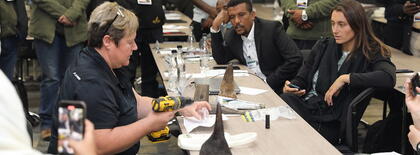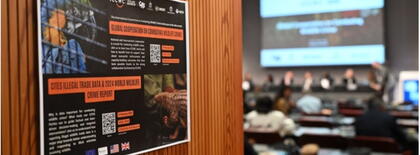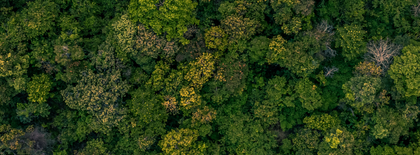Keynote Remarks
Caribbean Regional Wildlife Enforcement Workshop
John E. Scanlon, CITES Secretary General
Bahamas, 20- 22 July 2016
The Hon. Kenred Dorsett, Minister of Environment of the Bahamas
Her Excellency, Lisa Johnson, Chargé d’Affaires to the Bahamas from the United States of America
Mr. Amado Philip de Andrés, Regional Representative for Central America and the Caribbean, UNODC
Excellences, distinguished delegates, ladies and gentleman, friends of wildlife
Thank you very much for the opportunity to address you this morning for the Caribbean Regional Wildlife Enforcement Workshop, which has a great agenda and wonderful array of speakers.
The smuggling of rare iguanas spanning three continents, with the animals being poached in the Bahamas, trafficked into Europe and Southeast Asia, and involving nationals from at least five countries is not a case study but a real life case. It serves as a perfect example to demonstrate how illegal trade in wildlife is well organized, transnational and happening across every region.
In fact, the recent World Wildlife Crime Report published by UNODC, with support from the International Consortium on Combating Wildlife Crime (known as ICCWC), indicates that illegal wildlife trade is a truly global problem that affects every country either as a source, transit or destination State.
It is now well recognized that transnational organized crime groups are deeply involved in wildlife crime and they are driving the industrial scale illicit trafficking that we are confronting.
Illegal trade in wildlife includes a chain of criminality between the source and the final destination that can stretch from forests and rural villages, to large cities, across provincial and national borders, until the illegally traded animal or plant specimens are delivered many thousands of kilometres away to illicit markets, unscrupulous dealers and often to uninformed consumers. This highlights the need for source, transit and destination States to work effectively together across the entire illegal trade chain, to put an end to this highly destructive criminal activity.
The Caribbean is a region of exceptional biodiversity as well as geographic, cultural, and political diversity. It is also a region where there are varying degrees of illegal trade in, for example, marine turtles, queen conch, sharks, birds, terrestrial reptiles, and forest products.
The United States and Europe are key markets for trafficked Caribbean wildlife, including purchases made by unknowing tourists who, for example, purchase coral and sea turtle souvenirs. The Caribbean region also serves as a consumer for trafficked wildlife from Central and South America.
Wildlife trafficking in the Caribbean – involving both animals and plants, terrestrial and marine species – may exist side-by-side with narcotics smuggling, human trafficking, and the movement of other forms of contraband.
Combating illicit wildlife trafficking presents major challenges, but the positive news is that there is a global collective effort underway to combat it and we are witnessing encouraging progress at national, regional and global levels.
CITES (the Convention on International Trade in Endangered Species of Wild Fauna and Flora) is a legally binding agreement between 182 Parties – 181 countries and the EU – that sets the international rules for wildlife trade by regulating international trade in over 35,000 species of wild animals and plants. The Convention has been in place for over 43 years and its Parties agree to regulate trade in CITES listed species in accordance with its provisions, including to take appropriate measures to enforce the Convention at the national level and to prohibit trade in violation of the Convention, and to take measures to penalize illegal trade. CITES was described in the World Wildlife Crime Report as an agreement of “remarkable scope and power.”
Over the past few years, we have seen a clear shift from pointing fingers to finding ways of better working together to address the challenges we are all facing. For example:
- CITES CoP16 (Bangkok, March 2013) was a watershed moment for combating wildlife crime, with many major decisions being taken by consensus.
- In July 2015, the UN General Assembly unanimously adopted a Resolution on ‘Tackling Illicit Trafficking in Wildlife’, the first dedicated Resolution on the topic adopted by the UNGA.
- In September 2015, we saw the UN Sustainable Development Summit adopting the new global Sustainable Development Goals, with specific targets on ending poaching and trafficking in wildlife.
- And in September this year, the 17th meeting of the CITES Conference of the Parties in Johannesburg, known as CoP 17 or the World Wildlife Conference, will take place and we expect a number of critical decisions to be taken by the 182 Parties to CITES on enhancing their collective efforts to tackle illegal trade in wildlife.
Since 2010, through the ICCWC partnership, the CITES Secretariat, INTERPOL, the UN Office of Drugs and Crime, the World Bank and the World Customs Organization, have scaled up their collective efforts to ensure that wildlife crimes are treated as serious crimes, with front line law enforcement support being provided to countries and regions in a more coordinated manner.
For the past five years, ICCWC has delivered a growing number of key activities, including the development of vital tools and the provision of crucial services for the law enforcement community, to support authorities around the world to respond more effectively to the severe threat posed by transnational organized criminal groups involvement in wildlife crime.
Efforts are, for example, currently underway to develop training materials on anti-money laundering with a focus on wildlife crime, and to implement the ICCWC Wildlife and Forest Crime Analytic Toolkit in around 20 countries. We have also developed an indicator framework on wildlife and forest crime for countries to be able to measure and monitor their enforcement efforts, responses and capacity, as well as guidelines and training videos on ivory sampling procedures. ICCWC is also providing specialized training and technical and operational support, such as through the deployment of WISTs (Wildlife Incident Support Teams) and supporting operations such as Operation INFRA TERRA, a global operation to track, trace and arrest wanted fugitives for wildlife crimes.
Thanks to donors, such as the United States of America, ICCWC is also supporting regional events such as this one, and will be convening the 2nd Global meeting of the Wildlife Enforcement Networks in September this year alongside CITES CoP17, with the first meeting having been held in Bangkok in 2013 at CITES CoP 16. Our colleagues will brief you in more detail on this upcoming meeting, but we do hope a representative from the Caribbean region can be nominated to participate and present on the outcomes of this week’s meeting.
Excellences, distinguished delegates, ladies and gentleman – it is only through joint and coordinated efforts that we will be able to succeed and bring these highly destructive crimes to an end.
Effectively addressing illicit trafficking in wildlife requires ongoing scaled up efforts at the national, regional, and global levels. The development of Wildlife Enforcement Networks has often helped improve law enforcement cooperation and led to enhanced successes in a number of regions.
This regional conference, being hosted by our close partner UNODC, on behalf of ICCWC, will help you discuss the existing challenges in the Caribbean and identify effective and sustainable solutions to enhancing collaboration and taking action against illegal wildlife trade in the region, which can be shared more widely at our CoP in September.
Thank you once again for the opportunity to address you today. I most certainly regret that I am not able to join you in person in the Bahamas but I am delighted that CITES is well represented by our good colleague Pia Jonsson.
I wish you every success over the coming days and look forward to learning of the outcomes of this most important meeting.



